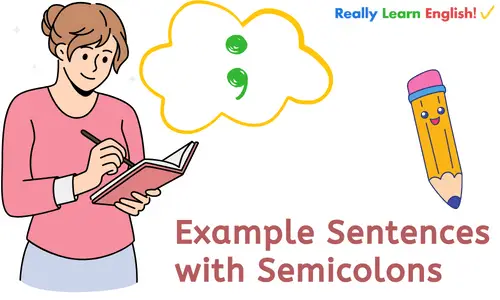Example Sentences with Semicolons ( ; )
Connecting Thoughts Correctly
In this lesson, we will look at many example
sentences with semicolons (;). This is a punctuation
mark that is often misunderstood. But it can be really useful
for joining two related ideas together!

Lesson Table of Contents
2) Example sentences with semicolons to make lists clearer
3) Example sentences with semicolons to join two closely related ideas
4) Additional example sentences with semicolons
5) Examples of using semicolons with adverbs
6) INCORRECT Example Sentence with Semicolon
8) Answer Key
Click Here for Step-by-Step Rules, Stories and Exercises to Practice All English Tenses
What Is a Semicolon?
A semicolon ( ; ) is a punctuation mark that is used to join two independent clauses.A clause is a group of words with a subject and a verb.
For example:
In the sentence, "Joe
can't dance very well, but
he sings beautifully" there are two clauses:
"Joe can't dance very well" (subject: Joe, verb: dance)
"But he sings beautifully" (subject: he, verb: sings)
"Joe can't dance very well" (subject: Joe, verb: dance)
"But he sings beautifully" (subject: he, verb: sings)
Another example is the sentence "Despite the fact he tries very hard, Joe can't dance very well". This sentence also has two clauses:
"Despite the fact he tries very hard" (subject: he, verb: tries)
"Joe can't dance very well" (subject: Joe, verb: dance)
An independent clause is a group of words that has a subject and a verb and can stand alone as a complete sentence.
In the examples above, the first sentence contains two independent clauses, while the second sentence contains an independent clause ("Joe can't dance very well") and a dependent clause ("Despite the fact he tries very hard").
The dependent clause is called "dependent" because it is totally dependent on the rest of the sentence for people to understand it.
The semicolon expresses a bigger pause than a comma ( , ) but a smaller pause than a period ( . ).
Nowadays writers mostly use semicolons for the following reasons:
- to make lists already containing commas easier to understand
- to show that two clauses are closely related
1.
Example sentences with semicolons to make lists clearer:
(The semicolons separate items already separated by
commas)- I'm planning to visit: Paris, France; London, England; Tokyo, Japan.
- We need to invite: Kate, Jack, and Sue; Ashley, Tony, and David; the Smiths and their friends.
- Please bring: a pen, paper, and calculator;
a laptop, mouse, and headphones.
- We can order: pizza, burgers, and fries; or chicken, tacos, and nachos.
- I have to pick up: groceries, laundry detergent, and cleaning supplies; a new dress for my sisters wedding; and my dry-cleaning.
- Joe was really excited; he had never been to a rock concert
before.
- I tried my best; unfortunately, I still failed the test.
- She was determined to finish the project; she stayed late at the office every night.
- The day was hot and humid; it was the perfect weather for a swim.
- The roads will be icy; please take extra care when driving home.
The examples above show how semicolons can be used to join two closely related ideas. As you can see, they create a pause in the sentence, allowing for better flow and clarity.
- We can order: pizza, burgers, and fries; or chicken, tacos, and nachos.
- I have to pick up: groceries, laundry detergent, and cleaning supplies; a new dress for my sisters wedding; and my dry-cleaning.
2.
Example sentences with semicolons to join two closely related
ideas:
- Joe was really excited; he had never been to a rock concert
before.- I tried my best; unfortunately, I still failed the test.
- She was determined to finish the project; she stayed late at the office every night.
- The day was hot and humid; it was the perfect weather for a swim.
- The roads will be icy; please take extra care when driving home.
The examples above show how semicolons can be used to join two closely related ideas. As you can see, they create a pause in the sentence, allowing for better flow and clarity.
Additional example sentences with semicolons:
- I really appreciate your help; thank you for doing this.- John is a very good basketball coach; he has won many championships.
- Kevin is a very friendly guy; he always says hello to everyone he meets.
- Molly enjoys going to the beach; she loves to swim in the ocean.
Examples of using semicolons with adverbs:
- She had the opportunity to travel; however, she decided to stay home.- He was very excited about the project; nevertheless, he decided to quit.
- She worked hard on the project; consequently, she got a good grade.
- She was very eager to start the job; nevertheless, she was afraid of failure.
- He was very committed to the project; therefore, he worked hard to complete it.
- They were both very happy with the result; nevertheless, they still disagreed on some points.
- She was very proud of her achievement;
however, she knew there was still room for improvement.
- He was very disappointed with the result; nonetheless, he recognized that he needed to continue to work hard.
- They were not happy with the result; nonetheless, they recognized that it was a necessary evil.
- He was very grateful for the opportunity; nevertheless, he knew it was not the perfect job for him.
- She wanted to make sure she did the best job; accordingly, she put in the extra effort.
- She had worked hard on the project; similarly, she was not willing to settle for anything less than perfection.
- He wanted to make sure he gets the best product; hence, he carefully read all the instructions.
- It's not easy to make a decision; still, I think I made the right one.
- He was very disappointed with the result; nonetheless, he recognized that he needed to continue to work hard.
- They were not happy with the result; nonetheless, they recognized that it was a necessary evil.
- He was very grateful for the opportunity; nevertheless, he knew it was not the perfect job for him.
- She wanted to make sure she did the best job; accordingly, she put in the extra effort.
- She had worked hard on the project; similarly, she was not willing to settle for anything less than perfection.
- He wanted to make sure he gets the best product; hence, he carefully read all the instructions.
- It's not easy to make a decision; still, I think I made the right one.
INCORRECT Example Sentence with Semicolon:
- "I love reading; writing; and playing the
piano."
(This sentence is incorrect because the semicolon should separate items in a list if they contain commas, but the items in this list do not contain commas.) - "I went to the store to buy milk; took an
umbrella."
(This sentence is incorrect because the semicolon should separate independent clauses, but the clause after the semicolon is not independent.) - "I went to the store to buy milk; I'm feeling
full."
(This sentence is incorrect because the two clauses are not closely related in meaning.) - "I love reading books; my favorite color is
blue."
(This sentence is incorrect because the two clauses are not closely related in meaning.)
Semicolons are often misunderstood and misused, but when used correctly they can make your sentences easier to understand. Overusing them, however, can lead to confusion and be distracting. So use them sparingly.
Semicolon Exercise
Which of the following sentences use a semicolon
INCORRECTLY?- "I went to the store to buy milk; I also needed bread and eggs for my breakfast tomorrow."
- "I love reading books; my favorite hobby is writing poetry."
- "I love reading books, writing poetry; and playing the piano."
- "I went to the movies with my friends; forgot my phone at home."
- "I was running late for work; so I had to skip my morning coffee."

Answer Key
1: Correct2: Incorrect
3: Incorrect
4: Incorrect
5: Correct
Get Updates, Special Offers, and English Resources
Download your FREE GIFT (the first two chapters of
English Short Stories Book and Workbook)
as soon as you join!

By submitting your email, you consent to receiving updates and newsletters from us and to the sharing of your personal data with third parties for the purposes of sending you communications. We will not spam you. You can unsubscribe at any time. For more information, please see our privacy policy.





